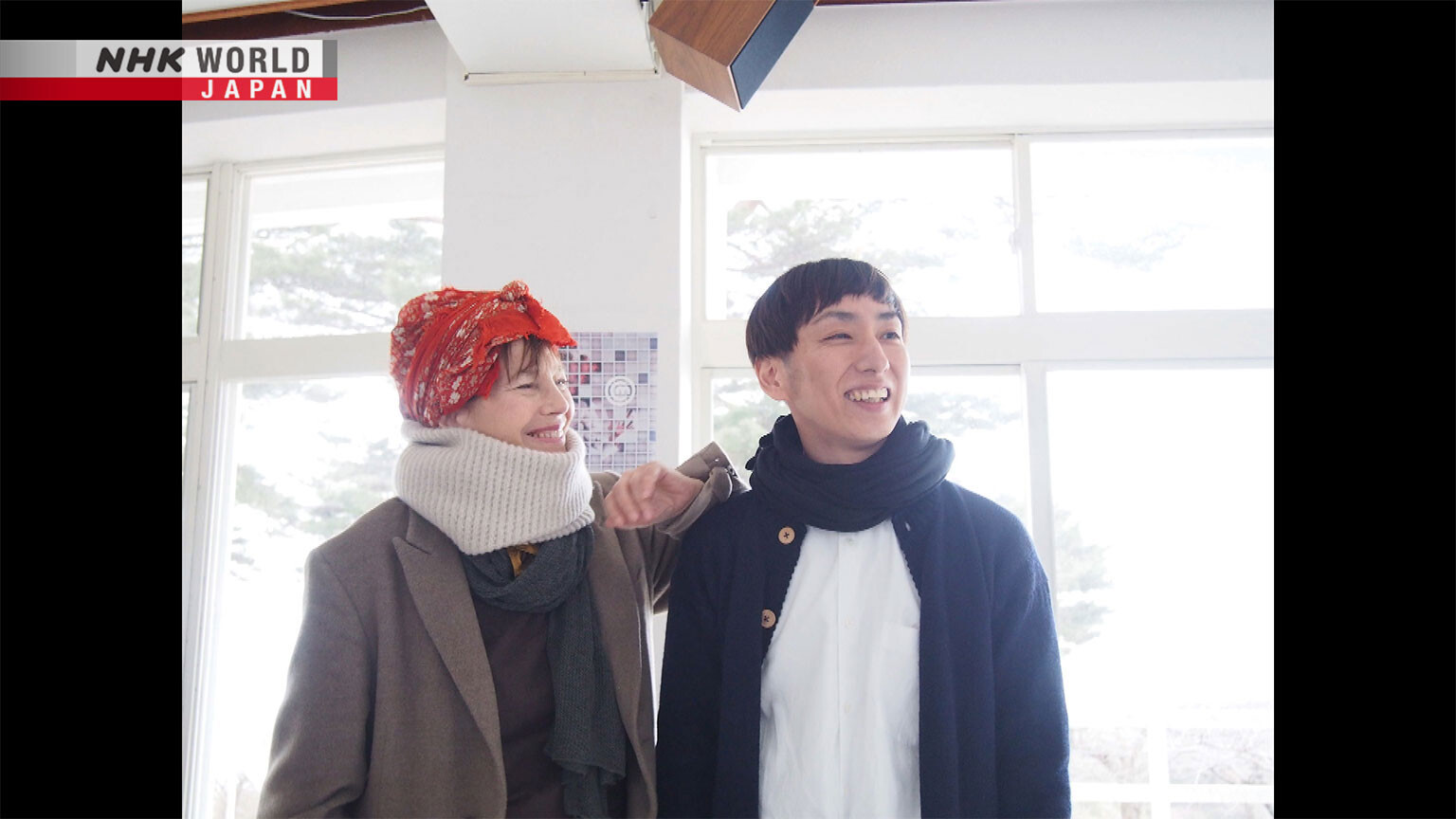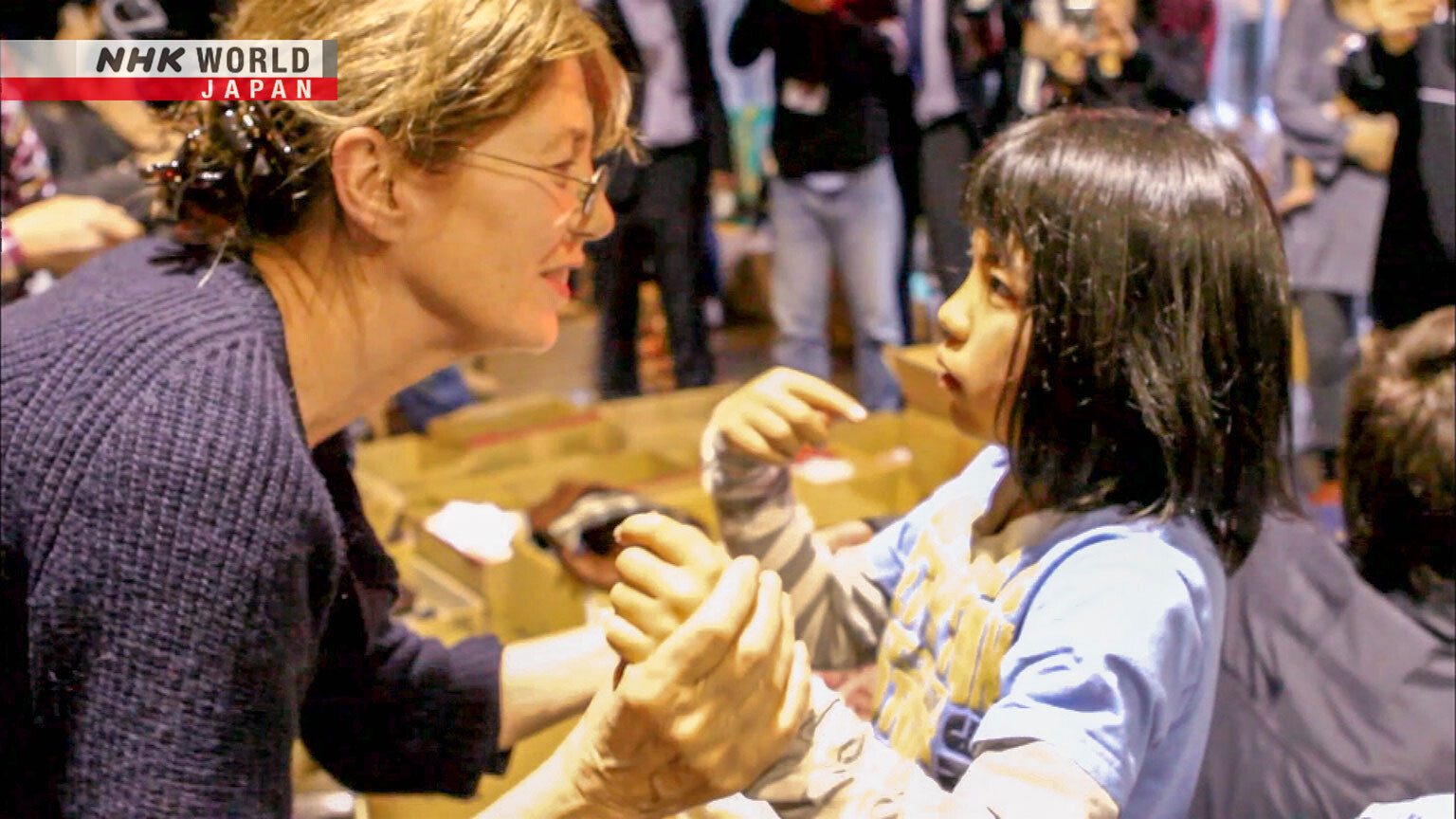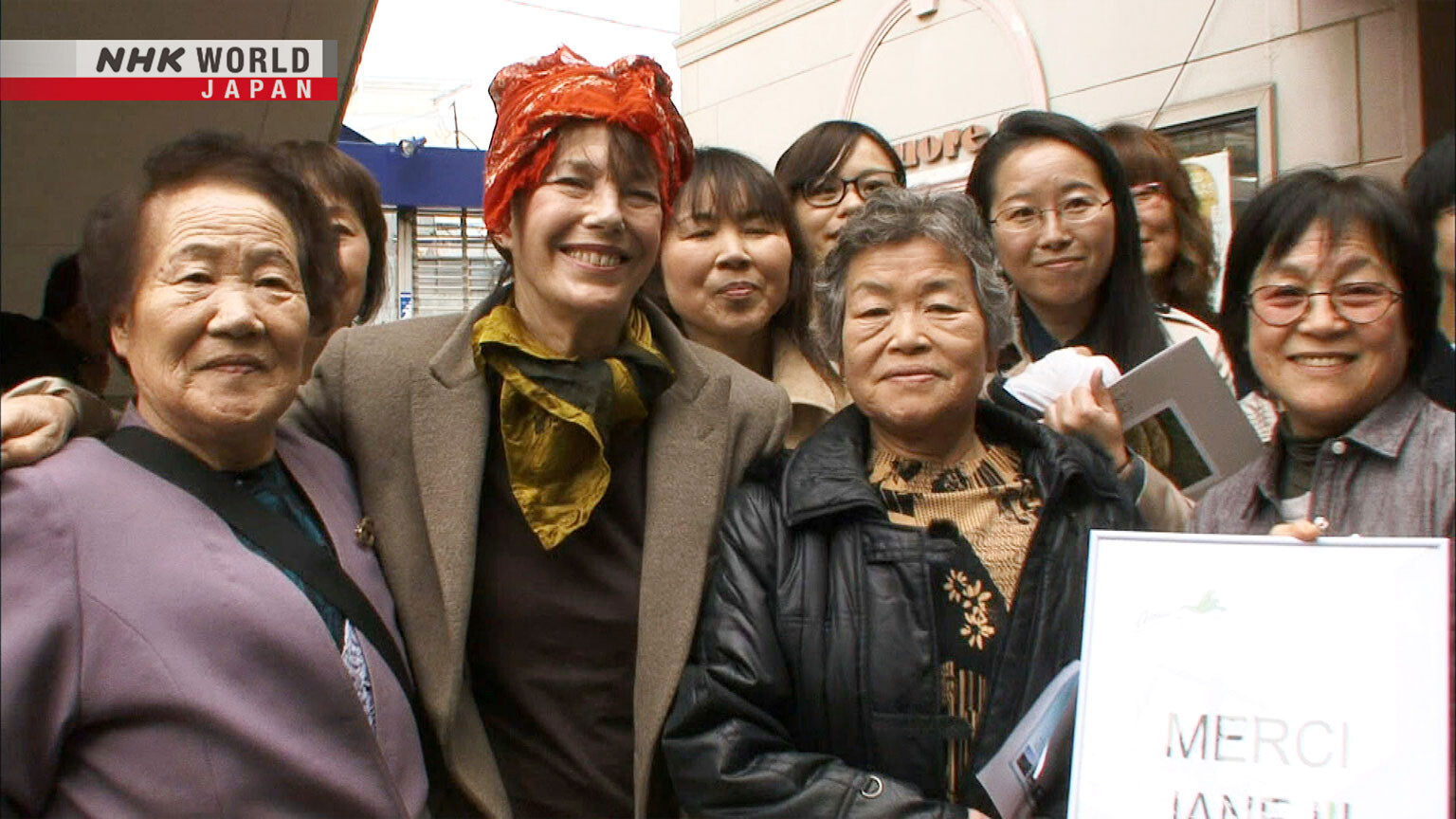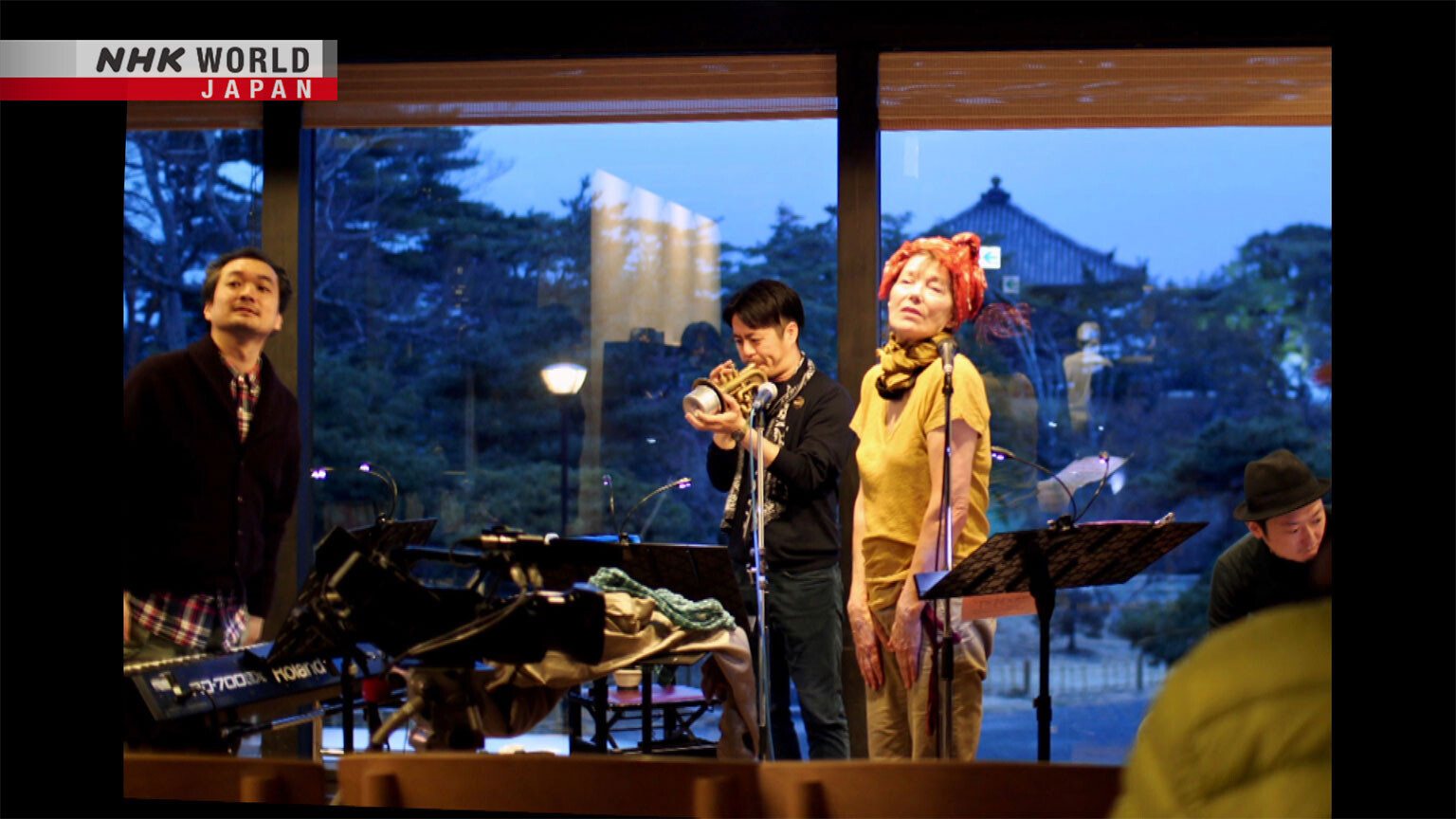Jane Birkin: A Japan Love Story
Artist and style icon Jane Birkin was devoted to empowering the survivors of the Great East Japan Earthquake and Tsunami. Even after her passing in 2023, her legacy lives on in their hearts.




Transcript
"a girl...we met...
in Tokyo...
spring...
2011"
A ballad by legend, Jane Birkin.
She wrote it after meeting a young evacuee in Tokyo just weeks following the Great East Japan Earthquake and Tsunami.
"I saw a little girl."
"'Were you afraid'"
"I said..."
Until her passing in 2023, the actor and singer had been devoted to caring for survivors.
I continue to support them, because for me it's impossible to stop.
This is the story of the bonds forged between Jane Birkin
and the people whose lives were forever touched by the disaster.
Traces of Jane Birkin linger in this cafe in a northeastern tourist town.
Chiba Shinichi, who was raised in Matsushima, opened his place in 2007.
With its ocean views, he set out to create a space to delight both visitors and locals.
But in March 2011, a massive earthquake devastated Tohoku, northeastern Japan.
More than 20,000 people died or went missing.
Chiba's cafe suffered damage.
And he suffered emotional wounds.
Honestly, I couldn't consider creating a beautiful space again under the circumstances.
During that difficult time - in 2013 - Jane Birkin was in Matsushima on her tour of impacted areas.
And...she held a concert for Chiba and his loved ones.
"I confess, I went through hell, not you, My love."
"Before I got wind of you, My love."
I think that was a huge thing for me.
In a fundamental way, Jane made me realize something profound.
British-born Jane Birkin shot to fame in the 1960s.
Her star as actor, model and singer continued to ascend after relocating to Paris.
Fans also admired her bohemian lifestyle, unfettered by convention, and soon she became a global style icon.
Jane fell in love with Japan more than half a century ago when she visited to promote a movie.
In our exclusive interview from 2021,
Jane spoke of that time as if it were yesterday.
When I visited temples, the children ran up to touch my hair because of the color.
It was all so adorable, like children sleeping on their fathers' motorbikes.
Everything we saw, like the teahouses, was new. Everything was exotic, sensual, exciting.
But it was the Japanese, in fact.
And their mentality was very different from our background. And we were curious.
Jane was hooked, and she sought out "things Japanese" back home in Paris.
She was a regular at this hand-cut soba shop.
She described this as her canteen.
I think she felt really close to my place.
No matter where Jane happened to be,
Japan never seemed far from her thoughts...
I was in front of my television in my Paris home.
And I was watching the monumental catastrophe.
Jane rushed to a Japanese tea shop she loved.
She arrived in tears.
I remember her coming in asking 'what can I do, how can I help?'
I immediately booked and purchased a plane ticket.
I filled suitcases with nutrition bars.
I came with kilos and kilos of food because I thought maybe people didn't have anything.
And so, I arrived in Tokyo - practically the only person on the plane.
It was a time when people were exiting, not entering Japan -
unnerved by the strong aftershocks and uncertain nuclear situation.
But Jane came to do what she did best.
Thank you.
I just would like to tell you that in France...
We admire you very much.
Your courage, your solidarity and your kindness to your people that are in such difficulties in the North.
I felt so bad looking at television in France and I just wanted to come to Tokyo to be with you.
"But it's you who wanted it, My love."
"Whether you admit it or not
As we danced the Javanaise,
We loved each other
For the time of one song."
To all Japanese.
Unable to travel to the stricken areas, Jane visited an evacuation shelter in Tokyo.
What's your name?
- Jane.
- Jane?
I'm Miu.
- "Et toi?"
- Miu.
Nakajima Nobuyuki is a composer and pianist.
I'm Nobuyuki.
He accompanied Jane on piano for her 2011 Tokyo charity concert.
That same year, composer Sakamoto Ryuichi commissioned the two to write a song for the survivors.
I immediately contacted Jane and said, 'Let's do this together.'
She responded, 'Of course,' agreeing right away.
The lyrics were inspired by the girl at the Tokyo shelter and the season of Jane's visit -
a time when cherry trees burst with new life following a long winter.
A year after the disaster, the two headed to this studio to record their song.
Hi, Jane.
I feel as though Jane is here, with the mic ready and all.
She arrived as always, as though she had floated in on a breeze.
Jane's homage to the survivors...
"I saw a little girl."
"'Were you afraid'"
"I said..."
"'I ran, alone.
no, not with my friends.'"
Nakajima was blown away by Jane's delivery.
She suddenly starts off not with the melody, only the words.
This way of storytelling brought the words alive.
I think she felt if there was melody throughout, it would have been too much.
So, she may have wanted to hold something back.
"just by myself,
I fled for life...
away from the sound, the wave...'"
She may have been frustrated by not being able to convey her message in person in 2011.
But in the end, she shares her hope for the future
through the imagery of the blooming cherry trees.
Of course, at the time this piece was being composed, many in Japan could not access such positive feelings.
But Jane wanted us to hold on to that feeling. I think she infused her lyrics with it.
In 2013, two years after the earthquake, Jane could finally visit the afflicted areas.
The tsunami here was 6.9 meters high.
That's not possible.
Not up to there.
I arrived yesterday.
Yes, here.
I felt very sad.
At last, Jane could perform the piece in front of the people she wrote it for.
"I saw a little girl."
"'Were you afraid'"
"I said..."
Chiba Shinichi is the manager of the cafe damaged by the earthquake.
His meeting with Jane was life-affirming.
Come on in.
He had opened up his home to the artist during her concert.
She removed her shoes.
Jane's socks had holes in them. She said, 'Oh, dear!' as she came in.
I remember thinking how charming she was.
Your dad and mom's cafe was a wreck.
But Jane came and cheered us up. She encouraged us to seek joy again.
It was like 'look further ahead, laugh.'
Until that moment, I couldn't smile much.
People had been telling us that we had to overcome the situation and work hard.
But with the word 'laugh,' Jane brought her own smile and warm spirit.
Two years after this encounter, Chiba reopened his cafe.
When I heard about Jane's passing and thought about her,
I remembered her encouraging us to smile.
And I felt she saved me all over again.
I think what she did was really important.
Bracelets - symbols of protection, love and connection.
Delicate pieces like this link Jane to Tohoku.
A women's group called Ama Project in Minamisanriku - an area ravaged by the tsunami - crafted them.
This work has given them purpose, and income.
Jane has been by their side all along...
On the packaging...
"For Ama members,
You have much courage. I admire and think of you. Jane"
Threaded with love, these bracelets created an intimate loop between Jane in Paris and the women in Minamisanriku.
It was Jane's old friend, journalist Murakami Kasumiko,
who launched the Ama Project with local supporters.
Originally, she was distributing necessities to Minamisanriku in the quake's aftermath.
But a survivor said the donations just reminded her of the desperate situation, adding to her misery.
That's what led to Murakami's Ama Project.
Jane loved the bracelet.
She was really enchanted with it.
For years, Jane supported the project in many ways, including selling the bracelets at her concerts.
This is a photo of Jane.
Ama group member, Takahashi Marie, was touched by Jane's devotion to helping complete strangers.
It was like an emotional connection...
Takahashi's Minamisanriku was slammed by a wall of water, in some places more than 20 meters high.
The tsunami engulfed her home.
Everything was washed away.
It was like a giant bucket of water had been dumped on our town, which vanished in an instant.
Stop, stop! Water, stop!
She lost her sister and other relatives who lived in a nearby town.
By chance, Takahashi had met her sister two days earlier while out shopping.
She congratulated me as my daughter had just been accepted to university.
That's what we talked about.
I think that was our last conversation...
With support from Jane, we started making the bracelets in this community center.
The Ama Project brought together women who had lost homes and family members.
After the disaster, Takahashi struggled.
But the project helped her reclaim her life.
I could let the tsunami reality go away for a bit. Let it disappear from my mind.
I may be here now thanks to that time.
The project was empowering...
It was a feeling of being self-reliant.
I am, of course, grateful for all the aid.
But still I wanted to be able to proudly say that I bought something with money I earned.
As time passed, some people moved on emotionally from the disaster.
And, it became a challenge for the women to keep the project running.
When Murakami, Ama's founder, suggested she could no longer carry on,
Jane said something that she would never forget.
She suddenly scolded me, saying 'That's misguided.
Once you extend your helping hand, you must never take it back.'
Jane was fully-in, constantly contributing ideas, like for this T-shirt.
She would never consider pulling out.
I think about the survivors all the time, 10 years and beyond.
I continue to support them, because for me it's impossible to stop.
If it can change these people's destiny just a little, just a little, just a little bit.
In a twist of fate, it would be Jane's turn to receive emotional support from Ama project members.
December of 2013...
Jane suddenly lost her eldest daughter, Kate Barry - just 46.
Jane kept questioning herself, 'What did I fail to do? What did I overdo?'
Like any mother would have done...
We kept up a curious routine.
I would go to her home two or three times a week in the afternoon.
I would tell her about work offers, because they kept coming in.
She wanted me to inform her, even knowing she would turn the work down.
She didn't want to do anything and couldn't.
Kate was a noted photographer.
She documented members of the Ama Project and exhibited the resulting body of work at a photo festival.
I didn't understand a word she was saying, but we gestured a lot.
I felt that she was a lovely person.
Jane must have been in tremendous shock.
To bring Jane a sense of solace, Takahashi and project members turned to folding origami cranes -
symbols of peace and prayer.
They did something very tender. When my daughter Kate died,
they made about a thousand little "origami" birds.
In bunches, just like this.
I thought it wasn't possible to lose a child.
Now I know it's possible.
The Ama Project members made these with Kate and me in their thoughts.
Very touching.
Jane had an unfulfilled wish...
to return to disaster-hit areas and rendezvous with old friends there.
Her words, inspired by a girl who survived a disaster, live on...
"She cried no more."
"Then I knew."
"the spring has come...
cherry trees have blossomed..."
"flowers, everywhere..."
With a hope for tomorrow, living for today...
Chiba mentors his town's younger generation.
With a hope for tomorrow, living for today...
Takahashi uses the abacus to instill confidence in kids.
How beautiful.
The surviving cherry trees... bloomed again this year.
I wish all survivors happiness.
All the Japanese, and Japanese women, the women.